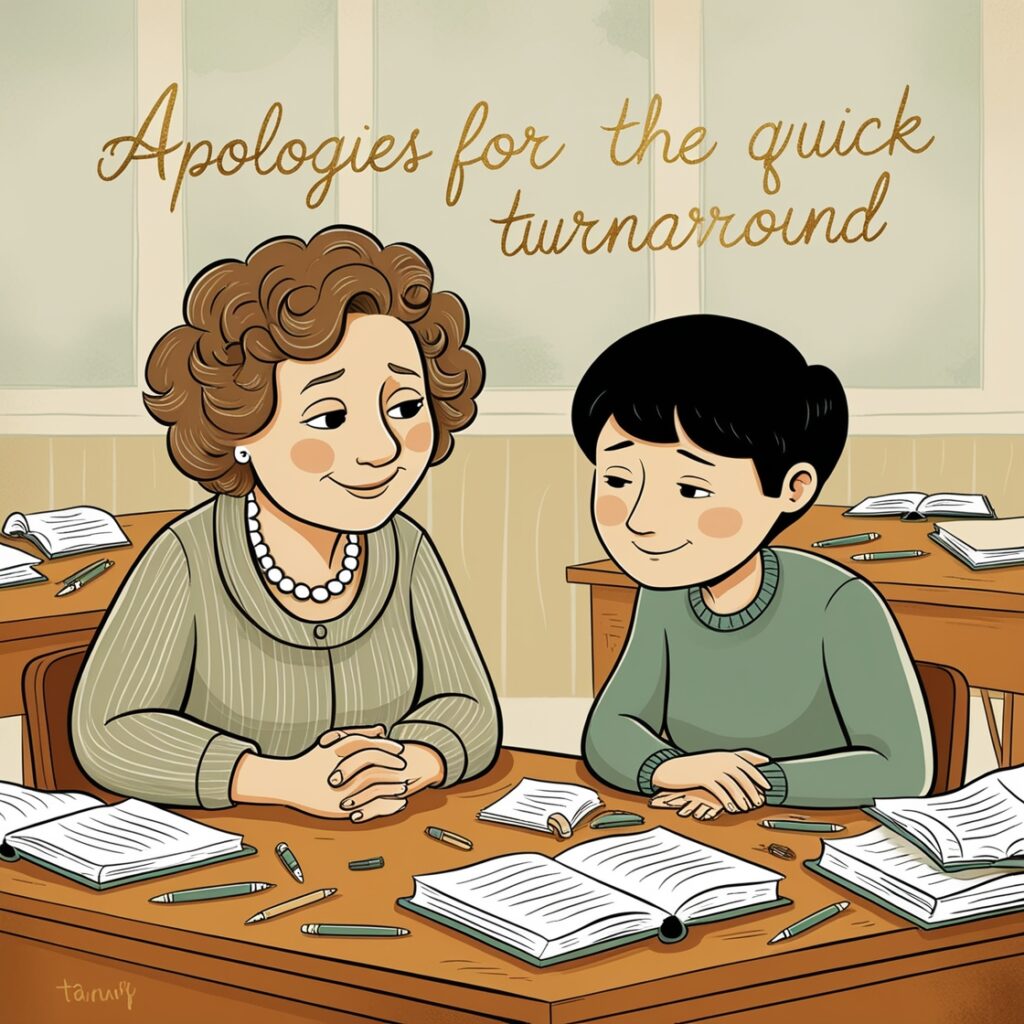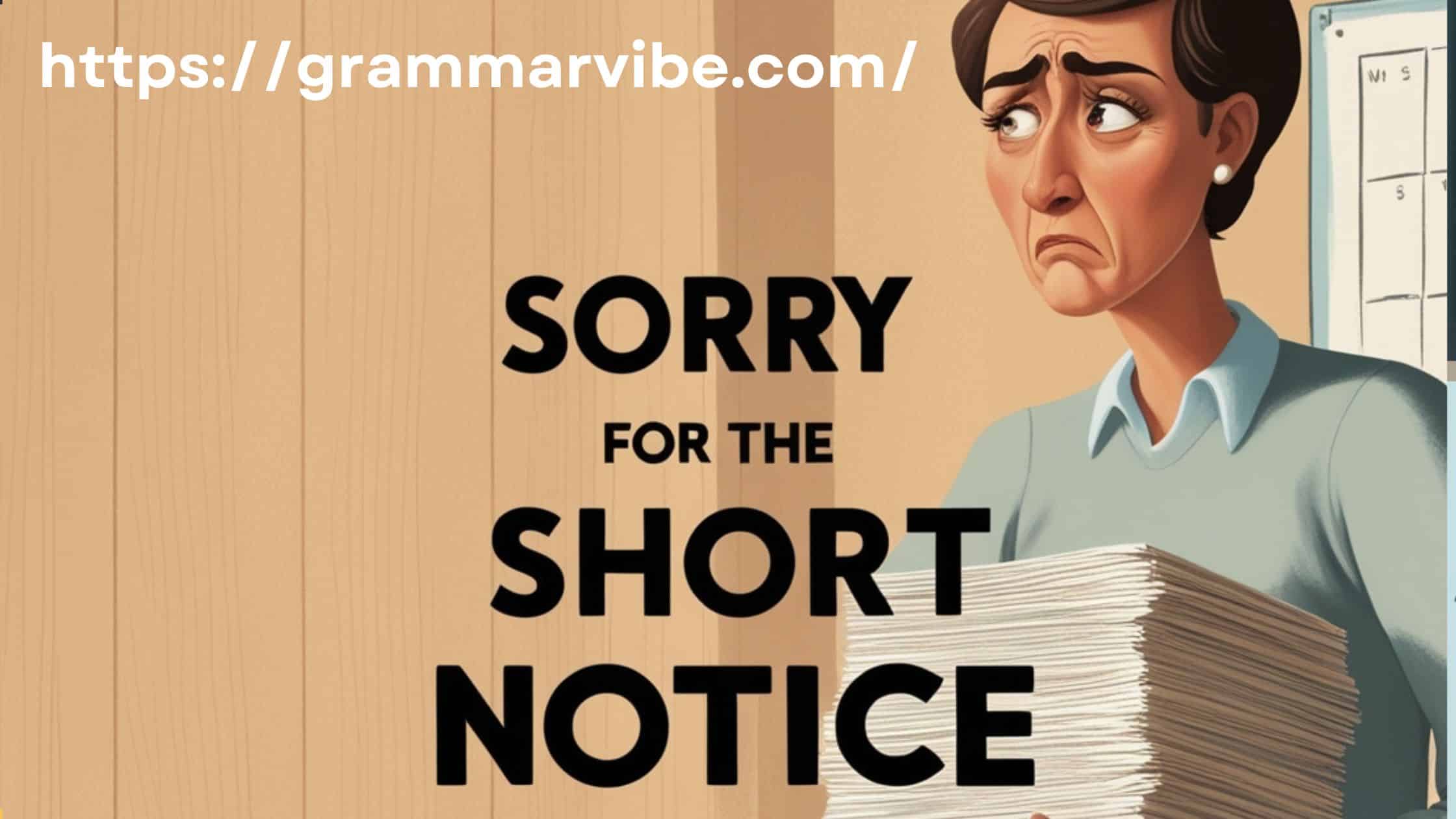In both formal and informal settings, it’s often necessary to convey messages on short notice. However, directly saying “Sorry for the short notice” may feel repetitive or lacking the right tone for specific situations.
This article explores alternative ways to express this sentiment, from formal business communications to casual conversations. We’ll also provide examples of how to use these phrases in context, ensuring that your communication remains polite and considerate.
Why Apologies for Short Notice Matter
Short notice can inconvenience others, especially when it disrupts schedules or changes plans at the last minute. Using thoughtful language shows respect for someone’s time and helps to maintain professionalism or politeness, depending on the context.
Different scenarios require varying levels of formality, and using the right phrase can soften the impact of short notice. Below, you’ll find a comprehensive guide to alternatives that fit a wide range of situations.
1. Apologies for the Late Notice (Formal)
“Apologies for the late notice” is a classic, professional phrase that works well in business communications. It’s polite and formal, making it suitable for emails, meetings, or corporate settings where timing is critical.
Example Email to a Client:
Dear Mr. Thompson,
Apologies for the late notice, but we need to reschedule tomorrow’s meeting to 11 AM instead of 9 AM due to an unforeseen scheduling conflict. I appreciate your flexibility and understanding.
Best regards,
Sarah Johnson
In this example, the phrase conveys both regret for the short timing and respect for the recipient’s schedule.
2. I Apologize for the Short Timing (Formal)
Another professional phrase that conveys accountability is “I apologize for the short timing.” This works well in formal emails or other communications where you want to maintain a businesslike tone.
Example Meeting Adjustment Email:
Dear Team,
I apologize for the short timing, but the project update meeting has been moved to 4 PM today. We will ensure that all relevant materials are sent to you beforehand to keep you up to date.
Best regards,
Jason Fields
This phrase fits business communications where a project timeline or meeting adjustment is needed.
You might also like: Other Ways to Say “Looking Forward to Talking to You”
3. Sorry for the Last-Minute Update (Informal)

For a more casual tone, especially in text messages or conversations with colleagues, “Sorry for the last-minute update” fits perfectly. It’s less formal but still polite.
Example Casual Message:
Hey Mike,
Sorry for the last-minute update, but I can’t make it to lunch today. Can we reschedule for next week?
This phrase is suitable for informal settings, such as a casual conversation or personal message.
4. Please Excuse the Quick Notice (Formal)
This alternative is appropriate when the timing of the notification is abrupt, but you still want to convey a level of professionalism and politeness.
Example Formal Email:
Dear Colleagues,
Please excuse the quick notice, but we’ll be holding a meeting tomorrow at 10 AM to address recent updates to the project timelines. Your participation is highly encouraged.
Best,
Emily Davis
This phrase is ideal when delivering quick business updates or change of plans that may affect multiple people.
More for you: Beauty’s or Beauties’ or Beauties
5. I Regret the Short Notice (Formal)
If the situation warrants a more formal and slightly more apologetic tone, “I regret the short notice” is an excellent option. It works well in corporate communications or formal letters.
Example Email to a Colleague:
Dear John,
I regret the short notice, but I need to push our meeting back by an hour. I hope this works for you.
Best regards,
Jessica Wong
This expression conveys that you are genuinely sorry for disrupting the recipient’s schedule.
6. Sorry for the Sudden Announcement (Informal)
“Sorry for the sudden announcement” works in conversational or informal situations when the timing of the notice catches people by surprise.
Example Group Chat Message:
Hey everyone,
Sorry for the sudden announcement, but the team dinner tonight is being pushed to 8 PM. Hope to see you all there!
This phrase is useful when communicating within informal groups, such as colleagues or friends.
7. My Apologies for the Brief Notice (Formal)
This phrase strikes a balance between professionalism and politeness, making it ideal for business emails or formal contexts.
Example Email for a Rescheduled Meeting:
Dear Ms. Parker,
My apologies for the brief notice, but the training session has been moved to Thursday at 2 PM. Please let me know if this timing works for you.
Best regards,
David Lee
This phrase conveys respect for the recipient’s schedule while maintaining a polite tone.
8. I’m Sorry for the Late Notification (Informal)
Perfect for less formal settings, this phrase is still polite but more conversational. It can be used in day-to-day communications with colleagues or friends.
Example Quick Message:
Hey Rebecca,
I’m sorry for the late notification, but we’ll need to move tomorrow’s call to the afternoon. Let me know what time works best for you.
In this case, the phrase sounds casual and friendly while still showing consideration.
Related Guide: Other Ways to Say “Happy Monday”
9. I Regret the Late Notice (Formal)
A bit more formal than the other alternatives, this phrase works well when addressing clients or colleagues in professional environments.
Example Client Email:
Dear Ms. Martinez,
I regret the late notice, but we need to push back our scheduled consultation to next week. I sincerely hope this doesn’t inconvenience you.
Warm regards,
Robert Gray
This phrase is respectful and communicates genuine regret for the short timing.
10. Sorry for the Rushed Information (Informal)
In a more casual setting, such as text messages or conversations, this phrase can be used to apologize for rushing through information or decisions.
Example Text:
Hey Jake,
Sorry for the rushed information, but we have to make a decision by noon today.
This works well when communicating casually but still politely.
11. Apologies for the Quick Turnaround (Formal)

A professional phrase for situations requiring fast decision-making or changes to plans. It fits nicely in formal emails.
Example Business Email:
Dear Mr. Taylor,
Apologies for the quick turnaround, but we need feedback on the project proposal by the end of today. Your prompt response is greatly appreciated.
Best regards,
Linda Morgan
This phrase is suitable for business communications requiring swift actions.
For your interest: Other Ways to Say “Mark Your Calendars”
12. Please Forgive the Short Warning (Informal)
An informal way to apologize when the timing of the notice is abrupt but not serious. It’s suitable for casual conversations or text messages.
Example Quick Note:
Hi Emma,
Please forgive the short warning, but we’re starting the meeting earlier than expected. Hope you can still join!
This phrase is a polite, friendly way to acknowledge last-minute changes.
13. Sorry for the Hasty Update (Informal)
Another casual option that works well when you need to inform someone quickly, especially in conversations or group chats.
Example Chat Message:
Hey Team,
Sorry for the hasty update, but we need to submit the report by 4 PM instead of 5 PM.
This is perfect for informal group communications.
Synonyms for “Sorry for the Short Notice”
| Synonym | Formality |
|---|---|
| Apologies for the late notice | Formal |
| I apologize for the short timing | Formal |
| Sorry for the last-minute update | Informal |
| Please excuse the quick notice | Formal |
| I regret the short notice | Formal |
| Sorry for the sudden announcement | Informal |
| My apologies for the brief notice | Formal |
| I’m sorry for the late notification | Informal |
| I regret the late notice | Formal |
| Sorry for the rushed information | Informal |
| Apologies for the quick turnaround | Formal |
| Please forgive the short warning | Informal |
| Sorry for the hasty update | Informal |

Kyren Paul is an experienced blogger and the creative mind behind “Grammar Vibe.” With a passion for the nuances of English grammar, he brings clarity and insight to everyday language topics, making grammar accessible and engaging for readers of all levels.











Leave a Comment